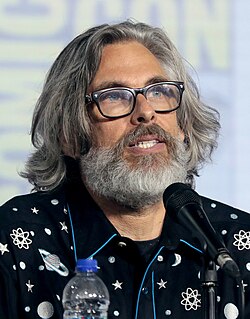Michael Chabon Quote
Sammy could not have known that one day he would come to regard all the things that their loving each other had seemed to put at so much risk--his career in comic books, his relations with his family, his place in the world--as the walls of a prison, an airless, lightless keep from which there was no hope of escape. Sammy had long since ceased to value the security that he had once been so reluctant to imperil.
Michael Chabon
Sammy could not have known that one day he would come to regard all the things that their loving each other had seemed to put at so much risk--his career in comic books, his relations with his family, his place in the world--as the walls of a prison, an airless, lightless keep from which there was no hope of escape. Sammy had long since ceased to value the security that he had once been so reluctant to imperil.
Related Quotes
The downfall of the attempts of governments and leaders to unite mankind is found in this- in the wrong message that we should see everyone as the same. This is the root of the failure of harmony. Bec...
C. JoyBell C.
Tags:
color, culture, difference, differences, equality, government, harmony, human, humanism, humanity
About Michael Chabon
Michael Chabon ( SHAY-bon;
born May 24, 1963) is an American novelist, screenwriter, columnist, and short story writer. Born in Washington, D.C., he spent a year studying at Carnegie Mellon University before transferring to the University of Pittsburgh, graduating in 1984. He subsequently received a Master of Fine Arts in creative writing from the University of California, Irvine.
Chabon's first novel, The Mysteries of Pittsburgh (1988), was published when he was 24. He followed it with Wonder Boys (1995) and two short-story collections. In 2000, he published The Amazing Adventures of Kavalier & Clay, a novel that John Leonard would later call Chabon's magnum opus. It received the Pulitzer Prize for Fiction in 2001.
His novel The Yiddish Policemen's Union, an alternate history mystery novel, was published in 2007 and won the Hugo, Sidewise, Nebula and Ignotus awards; his serialized novel Gentlemen of the Road appeared in book form in the fall of the same year. In 2012, Chabon published Telegraph Avenue, billed as "a twenty-first century Middlemarch", concerning the tangled lives of two families in the San Francisco Bay Area in 2004. He followed Telegraph Avenue in November 2016 with his latest novel, Moonglow, a fictionalized memoir of his maternal grandfather, based on his deathbed confessions under the influence of powerful painkillers in Chabon's mother's California home in 1989.
Chabon's work is characterized by complex language, and the frequent use of metaphor along with recurring themes such as nostalgia, divorce, abandonment, fatherhood, and most notably issues of Jewish identity. He often includes gay, bisexual, and Jewish characters in his work. Since the late 1990s, he has written in increasingly diverse styles for varied outlets; he is a notable defender of the merits of genre fiction and plot-driven fiction, and, along with novels, has published screenplays, children's books, comics, and newspaper serials.
born May 24, 1963) is an American novelist, screenwriter, columnist, and short story writer. Born in Washington, D.C., he spent a year studying at Carnegie Mellon University before transferring to the University of Pittsburgh, graduating in 1984. He subsequently received a Master of Fine Arts in creative writing from the University of California, Irvine.
Chabon's first novel, The Mysteries of Pittsburgh (1988), was published when he was 24. He followed it with Wonder Boys (1995) and two short-story collections. In 2000, he published The Amazing Adventures of Kavalier & Clay, a novel that John Leonard would later call Chabon's magnum opus. It received the Pulitzer Prize for Fiction in 2001.
His novel The Yiddish Policemen's Union, an alternate history mystery novel, was published in 2007 and won the Hugo, Sidewise, Nebula and Ignotus awards; his serialized novel Gentlemen of the Road appeared in book form in the fall of the same year. In 2012, Chabon published Telegraph Avenue, billed as "a twenty-first century Middlemarch", concerning the tangled lives of two families in the San Francisco Bay Area in 2004. He followed Telegraph Avenue in November 2016 with his latest novel, Moonglow, a fictionalized memoir of his maternal grandfather, based on his deathbed confessions under the influence of powerful painkillers in Chabon's mother's California home in 1989.
Chabon's work is characterized by complex language, and the frequent use of metaphor along with recurring themes such as nostalgia, divorce, abandonment, fatherhood, and most notably issues of Jewish identity. He often includes gay, bisexual, and Jewish characters in his work. Since the late 1990s, he has written in increasingly diverse styles for varied outlets; he is a notable defender of the merits of genre fiction and plot-driven fiction, and, along with novels, has published screenplays, children's books, comics, and newspaper serials.
